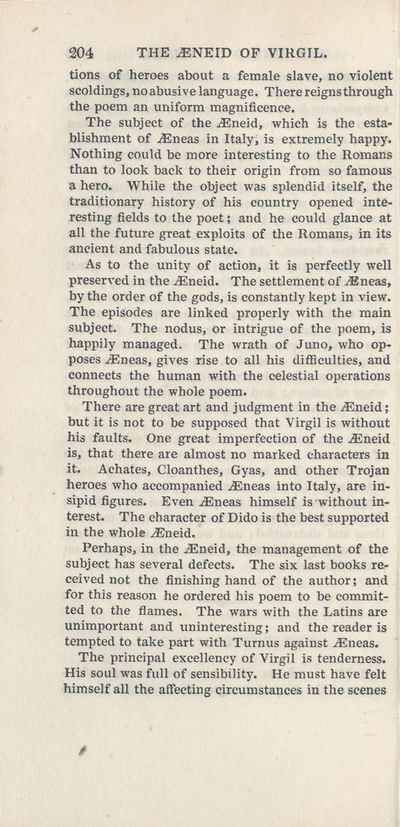Education > Essays on rhetoric
(232)
Download files
Complete book:
Individual page:
Thumbnail gallery: Grid view | List view

THE ^ENEID OF VIRGIL.
204
tions of heroes about a female slave, no violent
scoldings, no abusive language. There reigns through
the poem an uniform magnificence.
The subject of the iEneid, which is the esta¬
blishment of ./Eneas in Italy, is extremely happy.
Nothing could be more interesting to the Romans
than to look back to their origin from so famous
a hero. While the object was splendid itself, the
traditionary history of his country opened inte¬
resting fields to the poet; and he could glance at
all the future great exploits of the Romans, in its
ancient and fabulous state.
As to the unity of action, it is perfectly well
preserved in the zEneid. The settlement of /Eneas,
by the order of the gods, is constantly kept in view.
The episodes are linked properly with the main
subject. The nodus, or intrigue of the poem, is
happily managed. The wrath of Juno, who op¬
poses /Eneas, gives rise to all his difficulties, and
connects the human with the celestial operations
throughout the whole poem.
There are great art and judgment in the /Eneid;
but it is not to be supposed that Virgil is without
his faults. One great imperfection of the /Eneid
is, that there are almost no marked characters in
it. Achates, Cloanthes, Gyas, and other Trojan
heroes who accompanied /Eneas into Italy, are in¬
sipid figures. Even /Eneas himself is without in¬
terest. The character of Dido is the best supported
in the whole /Eneid.
Perhaps, in the /Eneid, the management of the
subject has several defects. The six last books re¬
ceived not the finishing hand of the author; and
for this reason he ordered his poem to be commit¬
ted to the flames. The wars with the Latins are
unimportant and uninteresting; and the reader is
tempted to take part with Turn us against /Eneas.
The principal excellency of Virgil is tenderness.
His soul was full of sensibility. He must have felt
himself all the affecting circumstances in the scenes
204
tions of heroes about a female slave, no violent
scoldings, no abusive language. There reigns through
the poem an uniform magnificence.
The subject of the iEneid, which is the esta¬
blishment of ./Eneas in Italy, is extremely happy.
Nothing could be more interesting to the Romans
than to look back to their origin from so famous
a hero. While the object was splendid itself, the
traditionary history of his country opened inte¬
resting fields to the poet; and he could glance at
all the future great exploits of the Romans, in its
ancient and fabulous state.
As to the unity of action, it is perfectly well
preserved in the zEneid. The settlement of /Eneas,
by the order of the gods, is constantly kept in view.
The episodes are linked properly with the main
subject. The nodus, or intrigue of the poem, is
happily managed. The wrath of Juno, who op¬
poses /Eneas, gives rise to all his difficulties, and
connects the human with the celestial operations
throughout the whole poem.
There are great art and judgment in the /Eneid;
but it is not to be supposed that Virgil is without
his faults. One great imperfection of the /Eneid
is, that there are almost no marked characters in
it. Achates, Cloanthes, Gyas, and other Trojan
heroes who accompanied /Eneas into Italy, are in¬
sipid figures. Even /Eneas himself is without in¬
terest. The character of Dido is the best supported
in the whole /Eneid.
Perhaps, in the /Eneid, the management of the
subject has several defects. The six last books re¬
ceived not the finishing hand of the author; and
for this reason he ordered his poem to be commit¬
ted to the flames. The wars with the Latins are
unimportant and uninteresting; and the reader is
tempted to take part with Turn us against /Eneas.
The principal excellency of Virgil is tenderness.
His soul was full of sensibility. He must have felt
himself all the affecting circumstances in the scenes
Set display mode to:
![]() Universal Viewer |
Universal Viewer | ![]() Mirador |
Large image | Transcription
Mirador |
Large image | Transcription
| Antiquarian books of Scotland > Education > Essays on rhetoric > (232) |
|---|
| Permanent URL | https://digital.nls.uk/113762276 |
|---|
| Description | Thousands of printed books from the Antiquarian Books of Scotland collection which dates from 1641 to the 1980s. The collection consists of 14,800 books which were published in Scotland or have a Scottish connection, e.g. through the author, printer or owner. Subjects covered include sport, education, diseases, adventure, occupations, Jacobites, politics and religion. Among the 29 languages represented are English, Gaelic, Italian, French, Russian and Swedish. |
|---|

